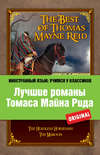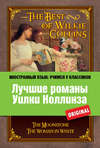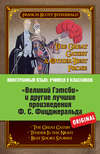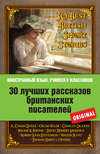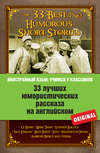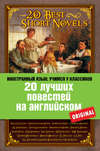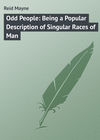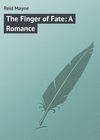Buch lesen: «Лучшие романы Томаса Майна Рида / The Best of Thomas Mayne Reid», Seite 18
Chapter 35
An Uncourteous Host
“The chicken-hearted fool! Fool myself, to have trusted to such a hope! I might have known she’d cajole the young calf, and let the scoundrel escape. I could have shot him from behind the tree – dead as a drowned rat! And without risking anything – even disgrace! Not a particle of risk. Uncle Woodley would have thanked me – the whole settlement would have said I had done right. My cousin, a young lady, betrayed by a common scamp – a horse trader – who would have said a word against it? Such a chance! Why have I missed it? Death and the devil – it may not trump up again!”
Such were the reflections of the ex-captain of cavalry, while at some paces distance following his two cousins on their return to the hacienda.
“I wonder,” muttered he, on re-entering the patio225, “whether the blubbering baby be in earnest? Going after to apologise to the man who has made a fool of his sister! Ha – ha! It would be a good joke were it not too serious to be laughed at. He is in earnest, else why that row in the stable? ’Tis he bringing but his horse! It is, by the Almighty226!”
The door of the stable, as is customary in Mexican haciendas opened upon the paved patio.
It was standing ajar; but just as Calhoun turned his eye upon it, a man coming from the inside pushed it wide open; and then stepped over the threshold, with a saddled horse following close after him.
The man had a Panama hat upon his head, and a cloak thrown loosely around his shoulders. This did not hinder Calhoun from recognising his cousin Henry, as also the dark brown horse that belonged to him.
“Fool! So – you’ve let him off?” spitefully muttered the ex-captain, as the other came within whispering distance. “Give me back my bowie and pistol. They’re not toys suited to such delicate fingers as yours! Bah! Why did you not use them as I told you? You’ve made a mess of it!”
“I have,” tranquilly responded the young planter. “I know it. I’ve insulted – and grossly too – a noble fellow.”
“Insulted a noble fellow! Ha – ha – ha! You’re mad – by heavens, you’re mad!”
“I should have been had I followed your counsel, cousin Cash. Fortunately I did not go so far. I have done enough to deserve being called worse than fool; though perhaps, under the circumstances, I may obtain forgiveness for my fault. At all events, I intend to try for it, and without losing time.”
“Where are you going?”
“After Maurice the mustanger – to apologise to him for my misconduct.”
“Misconduct! Ha – ha – ha! Surely you are joking?”
“No. I’m in earnest. If you come along with me, you shall see!”
“Then I say again you are mad! Not only mad, but a damned natural-born idiot! you are, by Jesus Christ and General Jackson!”
“You’re not very polite, cousin Cash; though, after the language I’ve been lately using myself, I might excuse you. Perhaps you will, one day imitate me, and make amends for your rudeness.”
Without adding another word, the young gentleman – one of the somewhat rare types of Southern chivalry – sprang to his saddle; gave the word, to his horse; and rode hurriedly through the saguan227.
Calhoun stood upon the stones, till the footfall of the horse became but faintly distinguishable in the distance.
Then, as if acting under some sudden impulse, he hurried along the verandah to his own room; entered it; reappeared in a rough overcoat; crossed back to the stable; went in; came out again with his own horse saddled and bridled; led the animal along the pavement, as gently as if he was stealing him; and once outside upon the turf, sprang upon his back, and rode rapidly away.
For a mile or more he followed the same road, that had been taken by Henry Poindexter. It could not have been with any idea of overtaking the latter: since, long before, the hoofstrokes of Henry’s horse had ceased to be heard; and proceeding at a slower pace, Calhoun did not ride as if he cared about catching up with his cousin.
He had taken the up-river road. When about midway between Casa del Corvo and the Fort, he reined up; and, after scrutinising the chapparal around him, struck off by a bridle-path leading back toward the bank of the river. As he turned into it he might have been heard muttering to himself —
“A chance still left; a good one, though not so cheap as the other. It will cost me a thousand dollars. What of that, so long as I get rid of this Irish curse, who has poisoned every hour of my existence! If true to his promise, he takes the route to his home by an early hour in the morning. What time, I wonder. These men of the prairies call it late rising, if they be abed till daybreak! Never mind. There’s yet time for the Coyote to get before him on the road! I know that. It must be the same as we followed to the wild horse prairies. He spoke of his hut upon the Alamo. That’s the name of the creek where we had our pic-nic. The hovel cannot be far from there! The Mexican must know the place, or the trail leading to it; which last will be sufficient for his purpose and mine. A fig for the shanty itself! The owner may never reach it. There may be Indians upon the road! There must be, before daybreak in the morning!”
As Calhoun concluded this string of strange reflections, he had arrived at the door of another “shanty” – that of the Mexican mustanger. The jacalé was the goal of his journey.
Having slipped out of his saddle, and knotted his bridle to a branch, he set foot upon the threshold.
The door was standing wide open. From the inside proceeded a sound, easily identified as the snore of a slumberer.
It was not as of one who sleeps either tranquilly, or continuously. At short intervals it was interrupted – now by silent pauses – anon by hog-like gruntings, interspersed with profane words, not perfectly pronounced, but slurred from a thick tongue, over which, but a short while before, must have passed a stupendous quantity of alcohol.
“Carrambo! carrai! carajo – chingara! mil diablos!” mingled with more – perhaps less – reverential exclamations of “Sangre228 de Cristo! Jesus! Santíssima Virgen! Santa Maria! Dios! Madre de Dios!229” and the like, were uttered inside the jacalé, as if the speaker was engaged in an apostrophic conversation with all the principal characters of the Popish230 antheon.
Calhoun paused upon the threshold, and listened.
“Mal – dit – dit – o!” muttered the sleeper, concluding the exclamation with a hiccup. “Buen – buenos nove-dad-es! Good news, por sangre Chrees – Chreest – o! Si S’ñor Merican – cano! Nove – dad – es s’perbos! Los Indyos Co – co – manchees on the war-trail – el rastro de guerra. God bless the Co – co – manchees!”
“The brute’s drunk!” said his visitor, mechanically speaking aloud.
“H’la S’ñor!” exclaimed the owner of the jacalé, aroused to a state of semi-consciousness by the sound of a human voice. “Quien llama! Who has the honour – that is, have I the happiness – I, Miguel Diaz – el Co – coyote, as the leperos231 call me. Ha, ha! coyo – coyot. Bah! what’s in a name? Yours, S’ñor? Mil demonios! who are you?”
Partially raising himself from his reed couch, the inebriate remained for a short time in a sitting attitude – glaring, half interrogatively, half unconsciously, at the individual whose voice had intruded itself into his drunken dreams.
The unsteady examination lasted only for a score of seconds. Then the owner of the jacalé, with an unintelligible speech, subsided into a recumbent position; when a savage grunt, succeeded by a prolonged snore, proved him to have become oblivious to the fact that his domicile contained a guest.
“Another chance lost!” said the latter, hissing the words through his teeth, as he turned disappointedly from the door.
“A sober fool and a drunken knave – two precious tools wherewith, to accomplish a purpose like mine! Curse the luck! All this night it’s been against me! It maybe three long hours before this pig sleeps off the swill that has stupefied him. Three long hours, and then what would be the use of him? ’Twould be too late – too late!”
As he said this, he caught the rein of his bridle, and stood by the head of his horse, as if uncertain what course to pursue.
“No use my staying here! It might be daybreak before the damned liquor gets out of his skull. I may as well go back to the hacienda and wait there; or else – or else – ”
The alternative, that at this crisis presented itself, was nor, spoken aloud. Whatever it may have been, it had the effect of terminating the hesitancy that living over him, and stirring him to immediate action.
Roughly tearing his rein from the branch, and passing it over his horse’s head, he sprang into the saddle, and rode off from the jacalé in a direction the very opposite to that in which he had approached it.
Chapter 36
Three Travellers on the same Track
No one can deny, that a ride upon a smooth-turfed prairie is one of the most positive pleasures of sublunary existence. No one will deny it, who has had the good fortune to experience the delightful sensation. With a spirited horse between your thighs, a well-stocked valise strapped to the cantle of your saddle, a flask of French brandy slung handy over the “horn,” and a plethoric cigar-case protruding from under the flap of your pistol holster, you may set forth upon a day’s journey, without much fear of feeling weary by the way.
A friend riding by your side – like yourself alive to the beauties of nature, and sensitive to its sublimities – will make the ride, though long, and otherwise arduous, a pleasure to be remembered for many, many years.
If that friend chance to be some fair creature, upon whom you have fixed your affections, then will you experience a delight to remain in your memory for ever.
Ah! if all prairie-travellers were to be favoured with such companionship, the wilderness of Western Texas would soon become crowded with tourists; the great plains would cease to be “pathless,” – the savannas would swarm with snobs.
It is better as it is. As it is, you may launch yourself upon the prairie: and once beyond the precincts of the settlement from which you have started – unless you keep to the customary “road,” indicated only by the hoof-prints of half a dozen horsemen who have preceded you – you may ride on for hours, days, weeks, months, perhaps a whole year, without encountering aught that bears the slightest resemblance to yourself, or the image in which you have been made.
Only those who have traversed the great plain of Texas can form a true estimate of its illimitable vastness; impressing the mind with sensations similar to those we feel in the contemplation of infinity.
In some sense may the mariner comprehend my meaning. Just as a ship may cross the Atlantic Ocean – and in tracks most frequented by sailing craft – without sighting a single sail, so upon the prairies of South-western Texas, the traveller may journey on for months, amid a solitude that seems eternal!
Even the ocean itself does not give such an impression of endless space. Moving in its midst you perceive no change – no sign to tell you you are progressing. The broad circular surface of azure blue, with the concave hemisphere of a tint but a few shades lighter, are always around and above you, seeming ever the same. You think they are so; and fancy yourself at rest in the centre of a sphere and a circle. You are thus to some extent hindered from having a clear conception of “magnificent distances.”
On the prairie it is different. The “landmarks” – there are such, in the shape of “mottes,” mounds, trees, ridges, and rocks – constantly changing before your view, admonish you that you are passing through space; and this very knowledge imbues you with the idea of vastness.
It is rare for the prairie traveller to contemplate such scenes alone – rarer still upon the plains of South-western Texas. In twos at least – but oftener in companies of ten or a score – go they, whose need it is to tempt the perils of that wilderness claimed by the Comanches as ancestral soil.
For all this, a solitary traveller may at times be encountered: for on the same night that witnessed the tender and stormy scenes in the garden of Casa del Corvo, no less than three such made the crossing of the plain that stretches south-westward from the banks of the Leona River.
Just at the time that Calhoun was making his discontented departure from the jacalé of the Mexican mustanger, the foremost of these nocturnal travellers was clearing the outskirts of the village – going in a direction which, if followed far enough, would conduct him to the Nueces River, or one of its tributary streams.
It is scarcely necessary to say, that he was on horseback. In Texas there are no pedestrians, beyond the precincts of the town or plantation.
The traveller in question bestrode a strong steed; whose tread, at once vigorous and elastic, proclaimed it capable of carrying its rider through a long journey, without danger of breaking down.
Whether such a journey was intended, could not have been told by the bearing of the traveller himself. He was equipped, as any Texan cavalier might have been, for a ten-mile ride – perhaps to his own house. The lateness of the hour forbade the supposition, that he could be going from it. The serape on his shoulders – somewhat carelessly hanging – might have been only put on to protect them against the dews of the night.
But as there was no dew on that particular night – nor any outlying settlement in the direction he was heading to – the horseman was more like to have been a real traveller – en route for some distant point upon the prairies.
For all this he did not appear to be in haste; or uneasy as to the hour at which he might reach his destination.
On the contrary, he seemed absorbed in some thought, that linked itself with the past; sufficiently engrossing to render him unobservant of outward objects, and negligent in the management of his horse.
The latter, with the rein lying loosely upon his neck, was left to take his own way; though instead of stopping, or straying, he kept steadily on, as if over ground oft trodden before.
Thus leaving the animal to its own guidance, and pressing it neither with whip nor spur, the traveller rode tranquilly over the prairie, till lost to view – not by the intervention of any object, but solely through the dimness of the light, where the moon became misty in the far distance.
Almost on the instant of his disappearance – and as if the latter had been taken for a cue – a second horseman spurred out from the suburbs of the village; and proceeded along the same path.
From the fact of his being habited in a fashion to defend him against the chill air of the night, he too might have been taken for a traveller.
A cloak clasped across his breast hung over his shoulders, its ample skirts draping backward to the hips of his horse.
Unlike the horseman who had preceded him, he showed signs of haste – plying both whip and spur as he pressed on.
He appeared intent on overtaking some one. It might be the individual whose form had just faded out of sight?
This was all the more probable from the style of his equitation – at short intervals bending forward in his saddle, and scanning the horizon before him, as if expecting to see some form outlined above the line of the sky.
Continuing to advance in this peculiar fashion, he also disappeared from view – exactly at the same point, where his precursor had ceased to be visible – to any one whose gaze might have been following him from the Fort or village.
An odd contingency – if such it were – that just at that very instant a third horseman rode forth from the outskirts of the little Texan town, and, like the other two, continued advancing in a direct line across the prairie.
He, also, was costumed as if for a journey. A “blanket-coat” of scarlet colour shrouded most of his person from sight – its ample skirts spread over his thighs, half concealing a short jäger rifle, strapped aslant along the flap of his saddle.
Like the foremost of the three, he exhibited no signs of a desire to move rapidly along the road. He was proceeding at a slow pace – even for a traveller. For all that, his manner betokened a state of mind far from tranquil; and in this respect he might be likened to the horseman who had more immediately preceded him.
But there was an essential difference between the actions of the two men. Whereas the cloaked cavalier appeared desirous of overtaking some one in advance, he in the red blanket coat seemed altogether to occupy himself in reconnoitring towards his rear.
At intervals he would slue himself round in the stirrups – sometimes half turn his horse – and scan the track over which he had passed; all the while listening, as though he expected to hear some one who should be coming after him.
Still keeping up this singular surveillance, he likewise in due time reached the point of disappearance, without having overtaken any one, or been himself overtaken.
Though at nearly equal distances apart while making the passage of the prairie, not one of the three horsemen was within sight of either of the others. The second, half-way between the other two, was beyond reach of the vision of either, as they were beyond his.
At the same glance no eye could have taken in all three, or any two of them; unless it had been that of the great Texan owl perched upon the summit of some high eminence, or the “whip-poor-will” soaring still higher in pursuit of the moon-loving moth.
An hour later, and at a point of the prairie ten miles farther from Fort Inge, the relative positions of the three travellers had undergone a considerable change.
The foremost was just entering into a sort of alley or gap in the chapparal forest; which here extended right and left across the plain, far as the eye could trace it. The alley might have been likened to a strait in the sea: its smooth turfed surface contrasting with the darker foliage of the bordering thickets; as water with dry land. It was illumined throughout a part of its length – a half mile or so – the moon showing at its opposite extremity. Beyond this the dark tree line closed it in, where it angled round into sombre shadow.
Before entering the alley the foremost of the trio of travellers, and for the first time, exhibited signs of hesitation. He reined up; and for a second or two sate in his saddle regarding the ground before him. His attention was altogether directed to the opening through the trees in his front. He made no attempt at reconnoitring his rear.
His scrutiny, from whatever cause, was of short continuance.
Seemingly satisfied, he muttered an injunction to his horse, and rode onward into the gap.
Though he saw not him, he was seen by the cavalier in the cloak, following upon the same track, and now scarce half a mile behind.
The latter, on beholding him, gave utterance to a slight exclamation.
It was joyful, nevertheless; as if he was gratified by the prospect of at length overtaking the individual whom he had been for ten miles so earnestly pursuing.
Spurring his horse to a still more rapid pace, he also entered the opening; but only in time to get a glimpse of the other, just passing under the shadow of the trees, at the point where the avenue angled.
Without hesitation, he rode after; soon disappearing at the same place, and in a similar manner.
It was a longer interval before the third and hindmost of the horsemen approached the pass that led through the chapparal.
He did approach it, however; but instead of riding into it, as the others had done, he turned off at an angle towards the edge of the timber; and, after leaving his horse among the trees, crossed a corner of the thicket, and came out into the opening on foot.
Keeping along it – to all appearance still more solicitous about something that might be in his rear than anything that was in front of him – he at length arrived at the shadowy turning; where, like the two others, he abruptly disappeared in the darkness.
An hour elapsed, during which the nocturnal voices of the chapparal – that had been twice temporarily silenced by the hoofstroke of a horse, and once by the footsteps of a man – had kept up their choral cries by a thousand stereotyped repetitions.
Then there came a further interruption; more abrupt in its commencement, and of longer continuance. It was caused by a sound, very different from that made by the passage of either horseman or pedestrian over the prairie turf.
It was the report of a gun, quick, sharp, and clear – the “spang” that denotes the discharge of a rifle.
As to the authoritative wave of the conductor’s baton the orchestra yields instant obedience, so did the prairie minstrels simultaneously take their cue from that abrupt detonation, that inspired one and all of them with a peculiar awe.
The tiger cat miaulling in the midst of the chapparal, the coyoté howling along its skirts; even the jaguar who need not fear any forest foe that might approach him, acknowledged his dread of that quick, sharp explosion – to him unexplainable – by instantly discontinuing his cries.
As no other sound succeeded the shot – neither the groan of a wounded man, nor the scream of a stricken animal – the jaguar soon recovered confidence, and once more essayed to frighten the denizens of the thicket with his hoarse growling.
Friends and enemies – birds, beasts, insects, and reptiles – disregarding his voice in the distance, reassumed the thread of their choral strain; until the chapparal was restored to its normal noisy condition, when two individuals standing close together, can only hold converse by speaking in the highest pitch of their voices!
